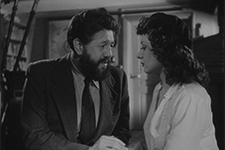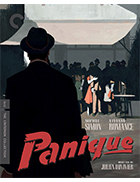Panique [Blu-Ray]
|

Panique, Julien Duvivier's scathing postwar assessment of human nature, unfolds within a shabby Parisian suburb, which Duvivier treats as a dramatic microcosm of humanity's toxic tendencies to be suspicious of difference, quick to judge, and easily swayed by the mentality of the mob. Duvivier, who had been one of the chief purveyors of 1930s French cinema's unique brand of romantic pessimism in films such as La bandéra (1935), La belle équipe (1936), and Pépé-le-Moko (1937), had escaped the country during World War II and worked in Hollywood, directing half a dozen studio projects of varying quality. Panique was his first production after returning to France, and it fit quite perfectly into French cinema's postwar tendencies toward film noir-esque evocations of personal betrayal and social conflict. Panique was scripted by Charles Spaak (The Grand Illusion) and Duvivier from a slim novel by the exceptionally prolific Georges Simenon, author of some 500 novels, roughly 170 of which have been adapted to film and television. It centers on a twisted romantic triangle: Alice (Viviane Romance), who has recently been released from prison, reunites with Capoulade (Max Dalban), the dapper criminal for whom she took the rap that put her behind bars. She is deeply in love with him, but she is also the object of desire for Monsieur Hire, a local eccentric who dabbles in astrology and has an aloof personality that keeps him largely isolated from his neighbors (not that he particularly cares). Played by the great Michel Simon, Monsieur Hire is as great, shaggy bear of a man who can appear alternately imposing and pathetic, creepy and gentle. He has a tendency to watch Alice through her window at night, and he pursues her with a strange mixture of childlike innocence and a deep sense of cunning that revolves primarily around information to which he is privy about Capoulade and the murder of a local woman that has all their neighbors on high alert. Capoulade convinces Alice to lead Monsieur Hire on as a means of eventually framing him for the murder, something that is all too easy to do because he is already seen by those in the neighborhood, particularly the overly talkative butcher and a snarky prostitute, as strange, different, odd—and therefore dangerous. He doesn't do anything overtly threatening, but he threatens nonetheless due to his refusal to fit in. Monsieur Hire makes no attempts to quash any suspicions of his otherness; in fact, he inadvertently flames them with his brusque interpersonal manner that tends to alienate even those who might try to be nice to him. Duvivier and cinematographer Nicolas Hayer (Le Corbeau) drench Panique in a shadowy film noir aesthetic that casts the world as a place of danger and deceit. While there are plenty of glamour shots of Viviane Romance, who by that point had perfected the role of the duplicitous femme fatale, and Max Dalban, who oddly appears to wear dark lipstick throughout the film, much of the action unfolds amid inky shadows and in isolated locations. And, when the action does transpire in seemingly ordinary locales, like a bumper-car ride or in the neighborhood square, Duvivier does everything he can to make it feel alien and uncomfortable. Such an approach fits the material and its paranoid view of human relations, but it also makes for a somewhat challenging experience because Duvivier refuses to give us anyone on screen with whom we can empathize. There are moments when we feel that Alice might be regretting her duplicity, and we can't help but feel for Monsieur Hire due to his social isolation and inability to determine that Alice is framing him (Capoulade, on the other hand, is a one-dimensional cad). Yet, in the end all of the characters are so deeply flawed that tragedy is inevitable, which takes some of the sting out of it (although the climax is both deeply suspenseful and emotionally exhausting). Duvivier, perhaps still smarting from having to use an alternate "happy" ending for La belle équipe, pulls no punches here in suggesting that humanity's fundamental characteristics can lead only to deceit and death.
Copyright © 2019 James Kendrick Thoughts? E-mail James Kendrick All images copyright © The Criterion Collection | |||||||||||||||||||||||||||||||
Overall Rating:



 (3.5)
(3.5)
Subscribe and Follow
Get a daily dose of Africa Leader news through our daily email, its complimentary and keeps you fully up to date with world and business news as well.
News RELEASES
Publish news of your business, community or sports group, personnel appointments, major event and more by submitting a news release to Africa Leader.
More Information
